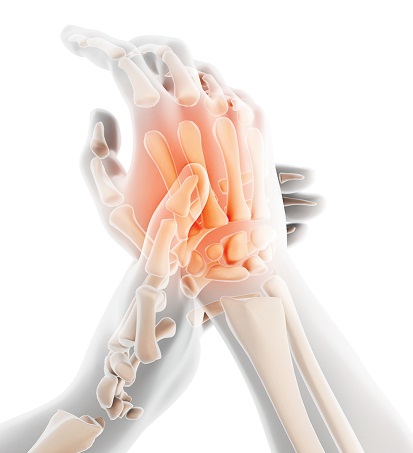
FAST FACTS: Rheumatoid Arthritis

Rheumatoid Arthritis (RA) is a long-term autoimmune disease (a disease in which the body produces antibodies that attack its own tissues). RA causes inflammation of joints and surrounding tissues and also affects other organs. RA occurs at any age and women are more likely to develop RA than men. RA usually affects both sides of the body and most frequently affects the wrists, fingers, knees, feet, and ankles. RA is a progressive disease with the potential to seriously impact function. RA that begins later in life is usually less severe. The beginning of RA is subtle and may follow symptoms such as general discomfort, weight loss, and vague joint pain or stiffness.
What Medical Professional Assess
- Characteristics of the pain such as when it started, the location of the pain, the effect of position change
- Morning stiffness lasting longer than 30 minutes then subsiding during the day
- Level of stiffness which returns after periods of daytime inactivity
- Joint warmth, tenderness, pain
- Degree of stress such as from infection, surgery, emotional trauma
Possible Interventions
- Medications
- Acetaminophen
- NSAIDS, such as Advil
- Other medications such as: Corticosteroids, Antirheumatics, Biologic Agents
- Non-Drug Treatments:
- Regular exercise is one of the MOST effective pain reducers
- Physical Therapy/Occupational Therapy: Range of Motion, heat/cold, splints, orthotic devices
- Lifestyle changes such as stress reduction and healthy diet
- Complementary Therapies such as meditation, yoga, acupuncture, massage, etc.
What Else You Should Do
- Write down and share information about your loved one’s pain with their healthcare provider
- Use a Pain Diary to note important information useful to the healthcare provider
- Encourage your loved one to try a non-drug treatment and document the impact on their pain in their Pain Diary
-
References:
- Centers for Disease Control and Prevention (CDC). July 27, 2020. Rheumatoid arthritis. Accessed 2.21.2022. https://www.cdc.gov/arthritis/basics/rheumatoid-arthritis.html
- Mayo Clinic. May 18, 2021. Rheumatoid arthritis. Accessed 2.21.2022. https://www.mayoclinic.org/diseases-conditions/rheumatoid-arthritis/symptoms-causes/syc-20353648
Revised January 2022
